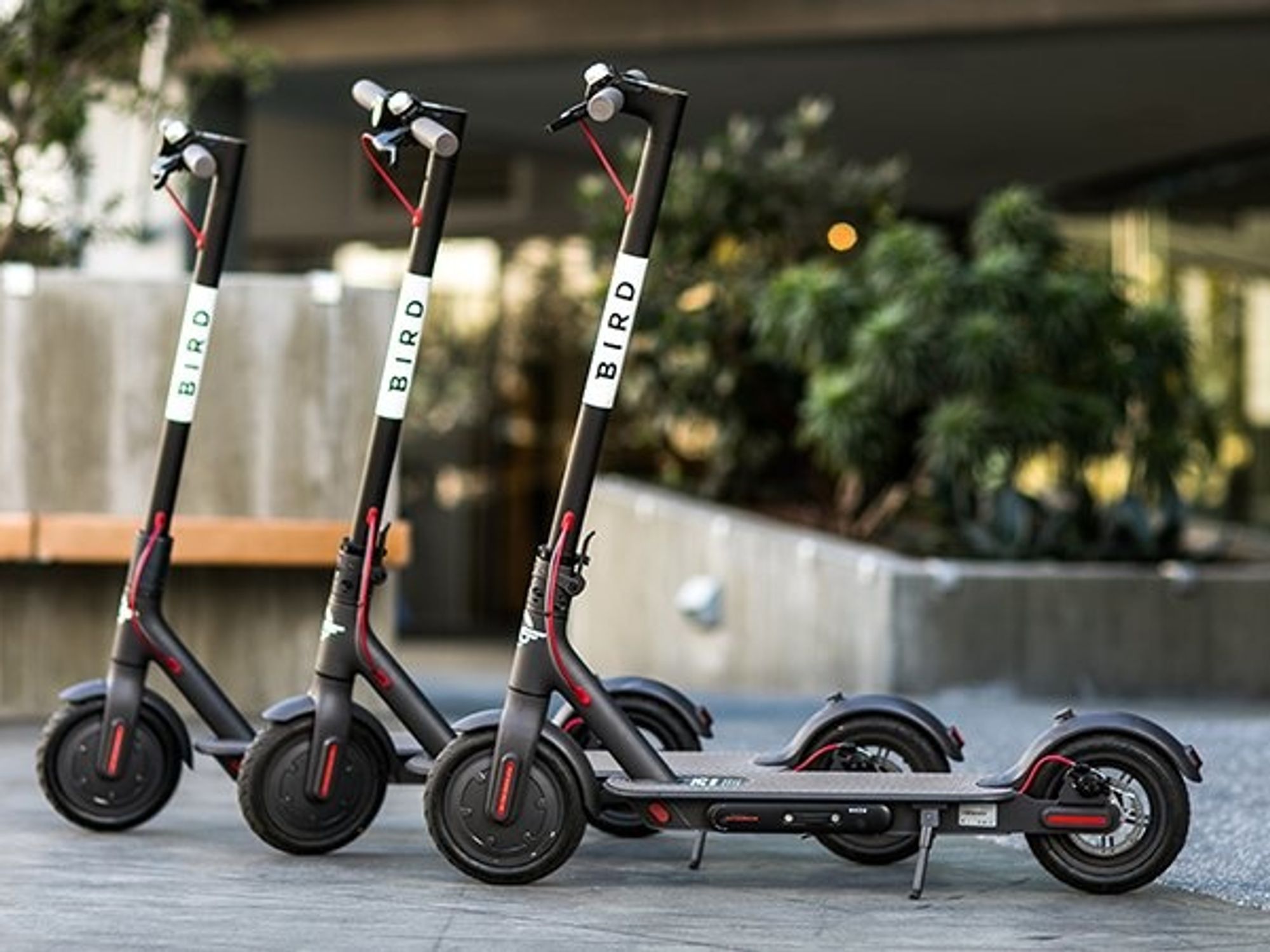Bird Seeks to Unload Santa Monica HQ as Fund Marks Down Shares
Ben Bergman is the newsroom's senior finance reporter. Previously he was a senior business reporter and host at KPCC, a senior producer at Gimlet Media, a producer at NPR's Morning Edition, and produced two investigative documentaries for KCET. He has been a frequent on-air contributor to business coverage on NPR and Marketplace and has written for The New York Times and Columbia Journalism Review. Ben was a 2017-2018 Knight-Bagehot Fellow in Economic and Business Journalism at Columbia Business School. In his free time, he enjoys skiing, playing poker, and cheering on The Seattle Seahawks.

After completing a costly renovation less than a year ago, the once high-flying e-scooter unicorn Bird Rides has put its airy and sleek Santa Monica offices up for sublease, dot.LA has learned. Prior to the pandemic, Bird was looking at tripling its local footprint, but now with a local workforce numbering less than half what it was before the pandemic and those who remain working from home indefinitely, the company is dramatically downscaling.
The move comes as Fidelity Investments filed a disclosure Friday with the SEC revealing it has marked down the value of its Bird investment by 17% since the beginning of the year.
Bird would not respond to questions sent by dot.LA, including whether it was attempting to unload its entire headquarters. But, the 79,019 square feet being offered appears to represent most — if not all — of the company's Santa Monica footprint. Former employees say it would be difficult to imagine splitting up two-story space, which could not be less suited to social distancing requirements.
"Bird had finished a massive expansion of that office space back in November of last year, which only doubled down on the 'openness' of the office," said the former employee who asked not to be named because they had to sign a nondisclosure agreement. "I don't see a conceivable way where they'd only be able to sublease a part of it and not all of it."
Bird spent several million dollars on network infrastructure and over a million dollars on furniture alone in last year's expansion, according to another former employee. The renovation opened up new desks, a number of new conference rooms, and a large kitchen with two buffet-style central islands where the company brought in daily catered lunches for employees from Halal Guys, Fresh Corn Grill and My Taco Guy on Taco Tuesday.
"Overall it was a really nice space," remembers a business operations employee who was laid off in March. "It kind of sucks things went down the way they did and remote work became mandatory."
Bird became the fastest company in history to reach unicorn status in 2018. Shortly after that, it achieved a $2 billion valuation in less than a year. But in March, it abruptly laid off 406 employees via a Zoom call that former employees described as dystopian. Headquarters was particularly hard hit, with the layoffs reducing the staff by more than half.
"Given the pandemic, Bird employees are currently working from home and the company is not currently utilizing the space," said a source at the company not authorized to talk on the record but who is close to the matter. The source portrayed the move as a reaction to the pandemic rather than indicative of anything about the company's financial performance.
Lime and Bird offices https://t.co/NgB5I2VbPE— EB (🏡,🏡) (@EB (🏡,🏡)) 1602043892
Pandemic Hits E-Scooters
The pandemic occurred at the worst possible time for e-scooter companies. They typically bring in little revenue in the cold winter months, recouping their investment in warmer weather. But in March, they had to pull their fleets and close down operations just as they would normally be returning to city streets. Cash-starved Lime, a Bird competitor that has also put up its offices for sublease, was forced to raise new capital at 79% discount from its last round in May.
Bird has the fortune of being better capitalized and in late January, the company raised another $75 million of Series D2 funding at a $2.77 billion valuation. But Dan Hoffer, managing director of Autotech Ventures, an early-stage venture firm focused on transportation, thinks Bird also might eventually be forced to raise a down round. He has long been skeptical that the company's unit economics can justify its lofty valuation.
"Our position is being validated right now as investors get wiped out and their companies recapped," Hoffer said. "In an environment in which multiples are retracting, having raised at a very high valuation is not always a good thing."
As a private company, Bird does not have to share its financials, which is why Fidelity's markdown is revealing. But the company has maintained that in many ways, the pandemic has been a positive as people eschew crowded buses and subways and cities use the crisis as a way to rethink city streets and prioritize scooters over automobiles. It is seeing riders take longer trips than they did before the pandemic and consolidation in the industry could be good for Bird, which is the market leader.
Early investors including Mark Suster, Upfront Ventures managing partner, say they remain bullish on Bird and that the company has done a good job of reducing expenses.

"The unit economics are already very positive," Suster said before headquarters was listed. "We have narrowed our losses because capital is harder to raise right now in the micro-mobility market."
Inside Bird, the latest move to get rid of headquarters is seen by some as a way to further trim expenses and prepare the company for an IPO or exit. The company has been able to continually improve its unit economics – each scooter model is less expensive and more durable – so cutting administrative costs is crucial.
Expansion Plans Halted
Before the pandemic, Bird was said to be on the hunt for up to 300,000 square feet of office space for a new corporate headquarters - more than tripling its current size, according to Michael Soto, research director at Savills, a commercial real estate advisory firm.
Soto says Bird is certainly not alone in trying to unload costly unused office space. The company's neighbor, Edmunds.com, has been attempting to sublease 195,000 square feet at the headquarters it opened to great fanfare in 2016 and Beachbody, a provider of fitness and weight-loss programs, is trying to shed 135,000 square feet in Santa Monica. (Beachbody did not respond to a request for comment. An Edmunds spokeswoman said the company has more square footage than it needs and noted that it was considering a sublease before the pandemic.)
"It's tough right now," said Soto. "There's just too much uncertainty in the economy so most companies are putting off signing deals unless they have to. And for those companies who are signing deals, there's a lot of kick-the-can-down-the-road short-term deals because a lot of companies aren't comfortable locking in a long-term financial commitment right now, especially since they don't know what they'll look like post-COVID or even if they'll keep their employees working from home."
One exception is Netflix, a major beneficiary of the stay-at-home economy, which signed a lease last month for 171,000 square feet to house its first dedicated animation studio in Burbank. LegalZoom also recently extended its 50,000 square feet lease in Glendale. But overall, just 1.6 million square feet of office space was leased in the third quarter in Los Angeles, a decline of 18% from the previous quarter and a 61% dropoff year over year, according to Savills.
"As long as uncertainty over COVID remains, overall leasing activity will continue to be low," Soto said. "That doesn't mean there aren't or won't be larger leases being signed over the short-term, but I really think those will continue to be the exception rather than the rule."
Bird moved into its current headquarters at the Colorado Center in 2018, signing a lease for 58,000 square feet, which it later expanded to 72,019 square feet. Other tenants include Hulu, Goop, and EHarmony.
Bird's listing says renters can occupy the space until either the end of 2023 or until next September, which is around the time Bird can execute a lease termination option, according to a source familiar with the matter.
- Bird Scooters Could Benefit From a Post-Covid World - dot.LA ›
- Bird Pay Will Let Scooter Users Purchase From Local Vendors - dot.LA ›
- Bird Acquires European e-Scooter Company Circ, Raises $75 ... ›
- Here's How Bird Laid Off 406 People in Two Minutes - dot.LA ›
- Bird Drops its Santa Monica HQ - dot.LA ›
- NASA's Plans to Create a Free Market in Space - dot.LA ›
- Bird Reportedly Explores Going Public via SPAC - dot.LA ›
- Fidelity Reportedly Seeks to Unload Bird Shares at a Loss - dot.LA ›
- Bird Plans to Go Public via SPAC at $2.3 Billion Valuation - dot.LA ›
- Bird Scooters Are Kicked Out of Santa Monica - dot.LA ›
- The Pandemic Forced a 'Hard Reset' On Public Transit. New Funding Could Change It Permanently - dot.LA ›
- Micromobility Is Failing LA. Here's How to Fix It - dot.LA ›
Ben Bergman is the newsroom's senior finance reporter. Previously he was a senior business reporter and host at KPCC, a senior producer at Gimlet Media, a producer at NPR's Morning Edition, and produced two investigative documentaries for KCET. He has been a frequent on-air contributor to business coverage on NPR and Marketplace and has written for The New York Times and Columbia Journalism Review. Ben was a 2017-2018 Knight-Bagehot Fellow in Economic and Business Journalism at Columbia Business School. In his free time, he enjoys skiing, playing poker, and cheering on The Seattle Seahawks.




 Image Source: JetZero
Image Source: JetZero